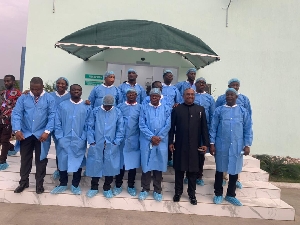The Pharmaceutical Society of Ghana (PSGH) has lauded Ghana’s leading sterile manufacturer, Atlantis Lifesciences Limited, for its far-advanced plans to introduce peritoneal dialysis treatment into Ghana.
According to the President of PSGH, Pharm. Dr. Samuel Kow Donkoh, the introduction of peritoneal dialysis in Ghana will not only make dialysis accessible to individuals with chronic kidney diseases (CKD) but will also afford them convenience in accessing healthcare.
“I was very impressed today that they are trying to get solutions by making peritoneal dialysis available in this country. That will ensure that a lot of patients suffering from what we call chronic kidney diseases, who need to be on dialysis until they get a transplant done; for those who cannot get a transplant eventually, that means they need to go on dialysis until they die. Some of these patients can now stay at home and do dialysis.
"So, the convenience that when you have chronic kidney disease you don’t need to go to Korle Bu like the last time we heard that Korle Bu dialysis centre had shut down and patients were struggling to find places to do it. Once they are going to create the dialysis solutions and all that is needed for the patient to render dialysis at home, which is peritoneal dialysis, that is indeed good news, something that is welcoming, and the government and the people of Ghana should really support Atlantic Lifesciences as well as Pharmanova,” he told the media during a visit by the Board of the Pharmaceutical Society of Ghana to the Prampram-based manufacturing plant of Atlantis Lifesciences on Tuesday, February 20, 2024.
While lauding the company for its solution-based approach towards sterile and pharmaceutical manufacturing in Ghana, Dr Kow Donkoh pledged the support of PSGH to the company in advancing its course for quality healthcare delivery in Ghana.
He assured that the Society will continue to be a leading advocate for the company and other manufacturing companies in the country while also collaborating with them in the area of research.
On his part, the Quality Assurance Manager at Atlantic Lifesciences, Smart Bediako, outlined some other solution-based projects being undertaken by the company to deal with health challenges including manufacturing of anti-snake serums.
He noted that the company has already concluded the manufacturing of three batches of anti-snake serums which are currently going through registration with the Food and Drugs Board Authority.
On the introduction of peritoneal dialysis into the country, Mr Bediako emphasized the advantages of home and the self-treatment that it offers.
“We are just going to start with the registration process. Before you start selling any product on the Ghanaian market you have to register with the FDA. We have imported them for manufacturing and we hope to produce the batches within the next two to three months, the products should be ready for registration. Depending on how long the registration will take, usually within four to six months maximum the product should be ready on the market.
“Once the registration is done then we will start to produce the commercial batches and then it will be available for Ghanaians. So we are projecting by the third quarter of this year, the peritoneal dialysis product should be on the market,” he added.
While noting the company’s role in Ghana’s economy, Mr. Bediako underscored the need for policies aimed at protecting local manufacturers and creating an enabling environment to accelerate their operations.
He mentioned constant power supply, tax incentives, and the need for restrictions on the importation of some products manufactured locally as some policy initiatives needed to propel the company’s operations.
According to current data, between 13% and 17% of Ghana’s population have some form of renal function impairment. This equates to between 4 million and 5.2 million citizens. Researchers suggest that from this segment of the population, between 15,000 and 19,500 should be on dialysis.
The data available suggests that approximately 2,000 people are currently on dialysis. This means between 13,000 and 17,500 people are without treatment with the reason largely being attributed to cost.
Currently, in Ghana, health facilities offer only hemodialysis which tends to be more expensive upfront as compared to peritoneal dialysis.
While hemodialysis requires more equipment and resources, such as a dialysis machine and a dedicated facility, as well as more frequent visits to a healthcare facility, which can increase costs related to transportation and healthcare personnel, peritoneal dialysis tends to offer lower upfront costs because it can often be done at home, reducing the need for expensive facility visits.
Recently, the Renal Unit of the Korle Bu Teaching Hospital had to shut down dialysis operations due to an unsuccessful 100% increment in the cost of dialysis treatment necessitated by the removal of tax and import duty exemptions on dialysis consumables.
General News of Thursday, 22 February 2024
Source: www.ghanaweb.com













